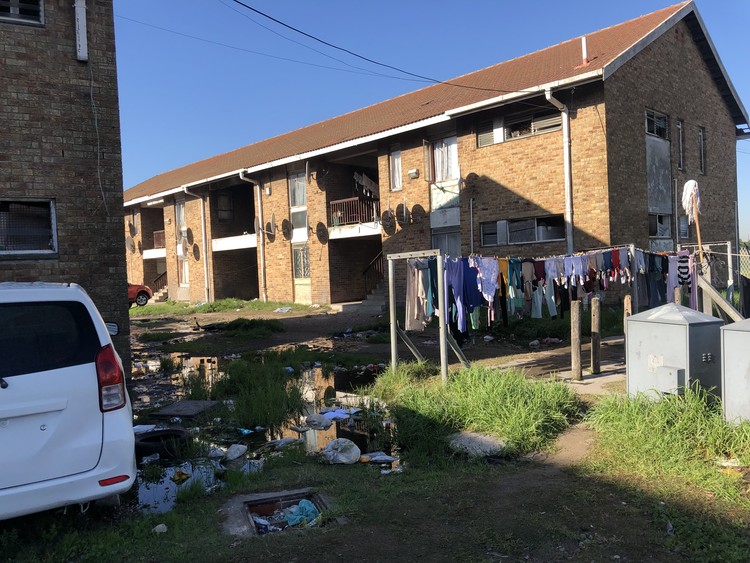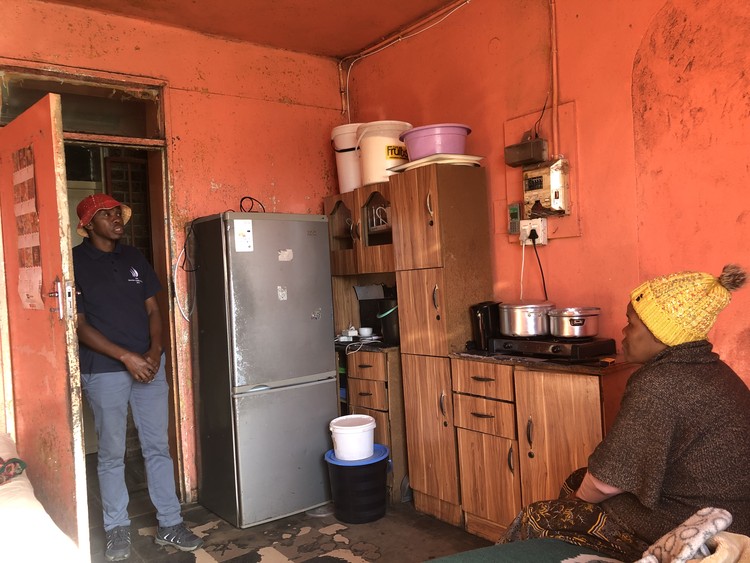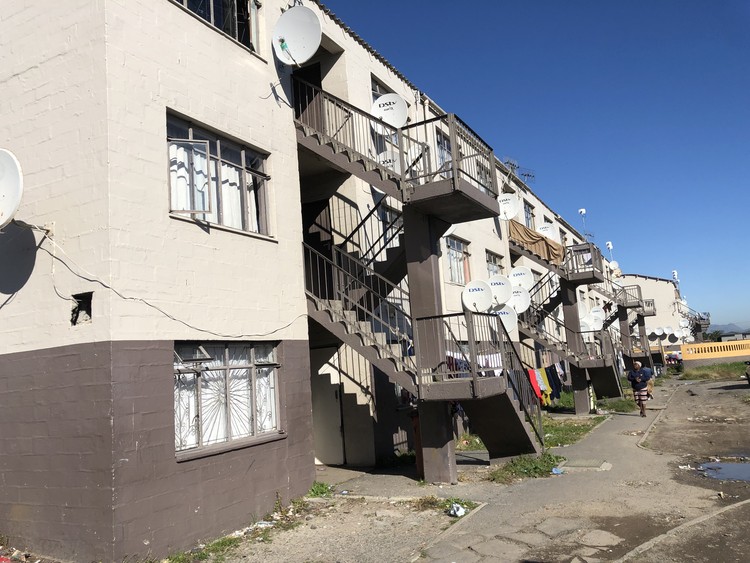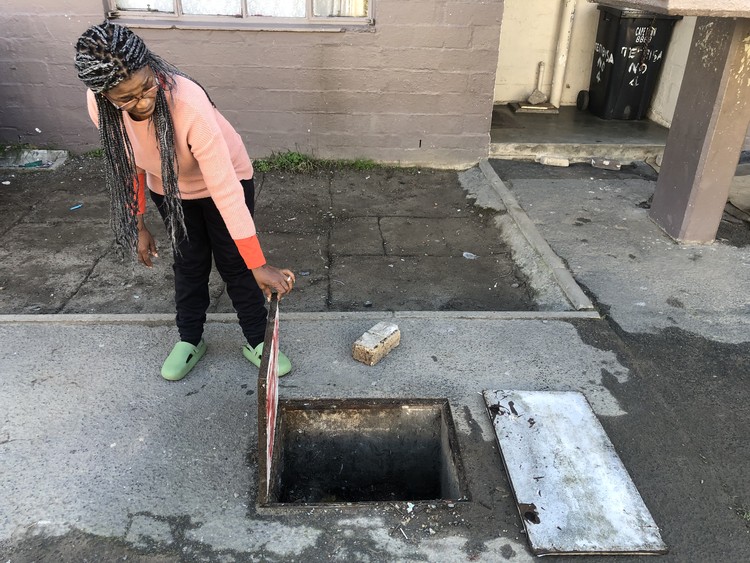No money to upgrade Cape Town’s rundown hostels
We visited hostels in Gugulethu which were overcrowded and falling apart
DairyBelle hostel in Gugulethu is home to about 300 tenants. The building is in a bad state with broken windows, stagnant water and litter strewn everywhere. The City of Cape Town says it proposed a plan to upgrade hostels like this but it needs funding. Photos: Mary-Anne Gontsana
- Living conditions in Gugulethu’s apartheid-era hostels are appalling.
- Many are overcrowded and falling apart. Some receive no waste management and sanitation services from the City of Cape Town.
- The City says it has proposed a plan to upgrade hostels, but it needs funding.
- But the Western Cape government says it would cost more money to upgrade the apartheid-era hostels than using their funds to service sites and provide emergency structures elsewhere.
Hundreds of people are living in apartheid-era hostels in Gugulethu in conditions that are barely habitable. Many of the hostels are overcrowded and falling apart. They receive inadequate municipal services such as waste management and sanitation.
The Western Cape government says it would cost more money to upgrade these hostels than to provide serviced emergency structures elsewhere.
We visited two hostels Gugulethu: DairyBelle, which is privately owned and Lingelihle, which is owned by the City. (There are six other City-owned hostels in Gugulethu.)
Many of the hostels were built for men coming to work in Cape Town from other provinces. But since democracy, the companies that managed these hostels abandoned them. Families then moved into these dorm-like buildings.
DairyBelle is in NY119, opposite the Gugulethu Seven Memorial. The brown building has broken windows and is surrounded by overgrown grass and puddles of stagnant green water. Litter is strewn everywhere.
Nomkhitha Njinge has been living at DairyBelle for more than 20 years. She shares a room with five other people. The orange walls are covered in mould and the door can barely close because it is damp and has swelled. Down the passage from her room is a communal bathroom with three toilets and sinks. She explains that these are constantly blocked.
Mzu Manyamalala and Nomkhitha Njinge in Njinge’s room. She shares this room with five other people.
“It’s damp here during winter and in summer we are overwhelmed by insects. The toilets are dark because there’s no electricity [due to the box being damaged] and the window frames have no glass. If we could at least get some services, it would help a lot,” says Njinge.
Mzu Manyamalala, chairperson of DairyBelle, explains it was built in the early 1970s for migrant labourers. “There are about 300 people living in seven blocks. Some people came from the Eastern Cape for job opportunities. Most rooms are occupied by four or five family members,” he says.
He claims the City of Cape Town’s former mayco member for human settlements Malusi Booi had promised them a new development. But nothing has come of this.
GroundUp reached out to the company that is supposed to manage DairyBelle, to no avail.
Lingelihle hostel in NY110 is managed by the City of Cape Town.
Not too far away from DairyBelle is Lingelihle Hostel in NY110. Residents we spoke to mainly complained about blocked sewerage. Unlike DairyBelle, services at this hostel are managed by the City.
The hostel is surrounded by smelly stagnant water. Nearly all the manholes on the property are covered with a wood sheet and bricks because the iron lids have been stolen and never replaced. We were shown a few of the manholes near a creche.
Asemahle Makunike has lived in Lingelihle since 2008 after marrying her husband who had been living there for many years. “The drains block all the time. This place is always wet,” she said.
Makunike said that when they report issues to the City, they are fixed. But the drains then block again.
Former ward councillor Mandisa Nikelo and Lingelihle committee member told GroundUp that for residents it feels like the City does not care about them. Nikelo said the hostel desperately needs a fence around it because of the high crime rate.
Carl Pophaim, mayco member for human settlements, said that although the hostel is City-owned, residents do not pay rent.
Pophaim said that the City has proposed a Hostel Transformation Programme but this is dependent on funding from the national and provincial human settlements departments. “The City is also considering alternatives if the funding is not approved,” he said.
Melchior Botes, spokesperson for MEC Tertuis Simmers, said that the hostel upgrading programme has been suspended. He said there is no sustainable financial model for them. They create “further significant financial deficits as there is minimal cost recovery” on them.
Resident Mandisa Nikelo shows what they use to cover open manholes around Lingelihle after the lids are stolen.
Support independent journalism
Donate using Payfast

Don't miss out on the latest news
We respect your privacy, and promise we won't spam you.
© 2025 GroundUp. This article is licensed under a Creative Commons Attribution-NoDerivatives 4.0 International License.
You may republish this article, so long as you credit the authors and GroundUp, and do not change the text. Please include a link back to the original article.
We put an invisible pixel in the article so that we can count traffic to republishers. All analytics tools are solely on our servers. We do not give our logs to any third party. Logs are deleted after two weeks. We do not use any IP address identifying information except to count regional traffic. We are solely interested in counting hits, not tracking users. If you republish, please do not delete the invisible pixel.




